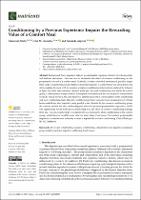Conditioning by a Previous Experience Impairs the Rewarding Value of a Comfort Meal

Date
2023-05-09Permanent link
https://hdl.handle.net/11351/9711DOI
10.3390/nu15102247
ISSN
2072-6643
WOS
000996541200001
PMID
37242129
Abstract
Background. Meal ingestion induces a postprandial experience that involves homeostatic and hedonic sensations. Our aim was to determine the effect of aversive conditioning on the postprandial reward of a comfort meal. Methods: A sham-controlled, randomised, parallel, single-blind study was performed on 12 healthy women (6 per group). A comfort meal was tested before and after coupling the meal with an aversive sensation (conditioning intervention), induced by infusion of lipids via a thin naso-duodenal catheter; in the pre- and post-conditioning tests and in the control group, a sham infusion was performed. Participants were instructed that two recipes of a tasty humus would be tested; however, the same meal was administered with a colour additive in the conditioning and post-conditioning tests. Digestive well-being (primary outcome) was measured every 10 min before and 60 min after ingestion using graded scales. Results: In the aversive conditioning group, the comfort meal in the pre-conditioning test induced a pleasant postprandial experience, which was significantly lower in the post-conditioning test; the effect of aversive conditioning (change from pre- to post-conditioning) was significant as compared to sham conditioning in the control group, which showed no differences between study days. Conclusion: The hedonic postprandial response to a comfort meal in healthy women is impaired by aversive conditioning. ClinicalTrials.gov ID: NCT04938934.
Keywords
Pavlovian conditioning; Digestive well-being; Eating behaviourBibliographic citation
Brown RM, Granero R, Jiménez-Murcia S, Fernández-Aranda F, Nieto A, Livovsky DM, et al. Conditioning by a Previous Experience Impairs the Rewarding Value of a Comfort Meal. Nutrients. 2023 May 9;15(10):2247.
Audience
Professionals
This item appears in following collections
- HVH - Articles científics [4476]
The following license files are associated with this item:

 Private area
Private area Contact Us
Contact Us







